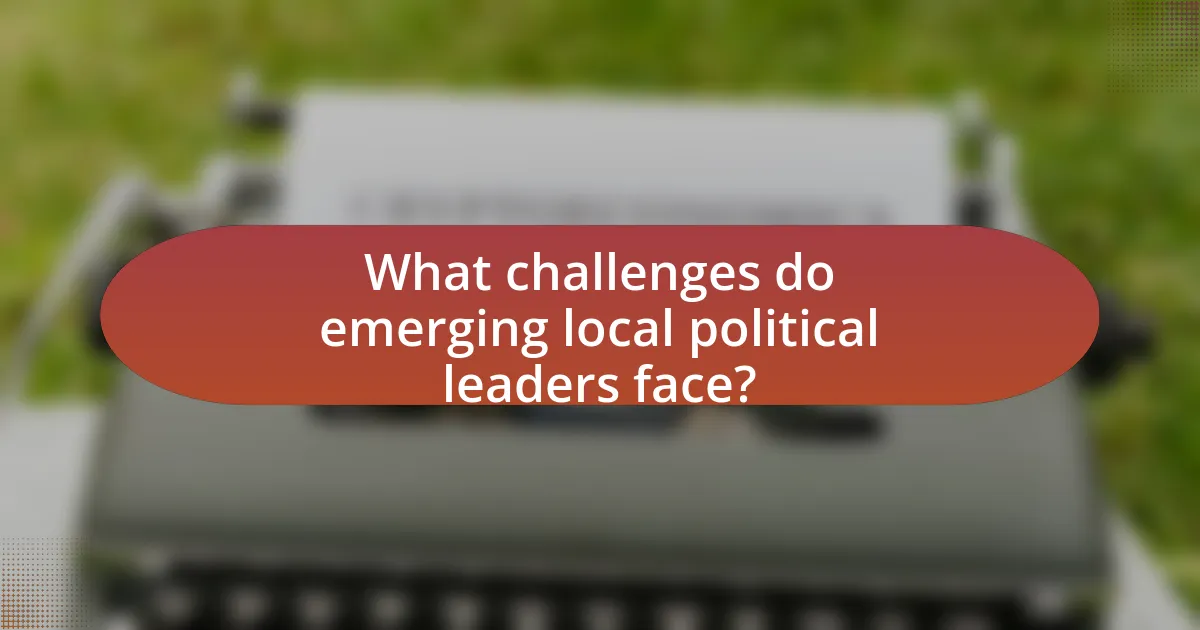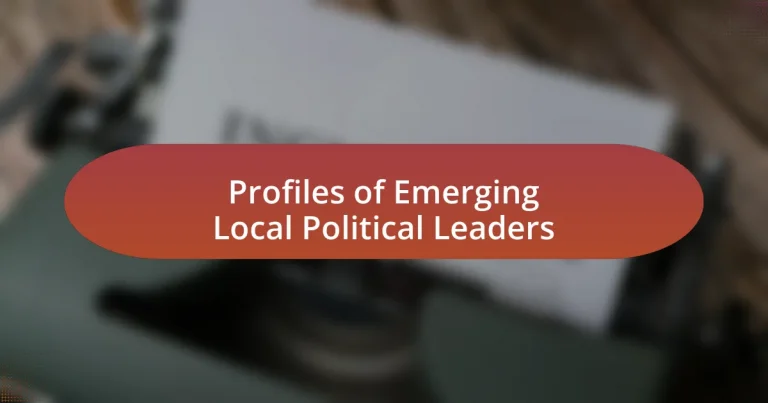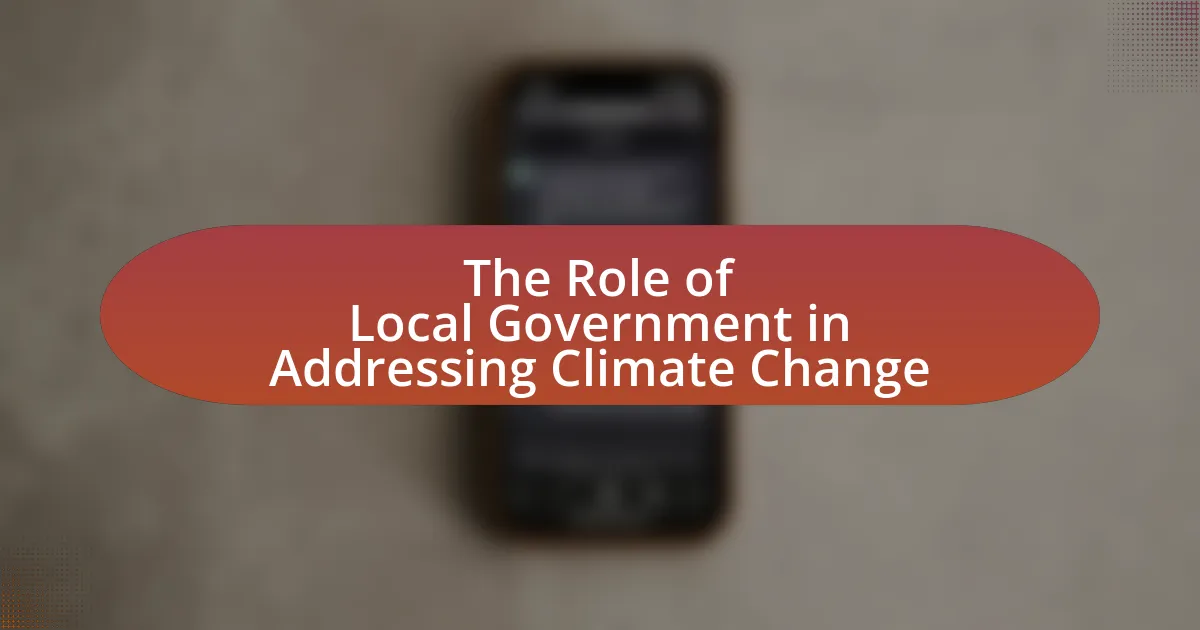The article focuses on the profiles of emerging local political leaders, highlighting their key characteristics such as community engagement, innovative problem-solving skills, and commitment to transparency. It contrasts these leaders with established figures, emphasizing their dynamic approaches to governance and communication, particularly through social media. The article also explores the traits that define successful leaders, the influence of personal backgrounds on leadership styles, and the significance of their emergence in enhancing local governance and civic participation. Additionally, it addresses the challenges these leaders face, the impact of political dynamics, and the resources available to support their development, while outlining strategies for effective engagement with constituents and maintaining accountability.

What are the characteristics of emerging local political leaders?
Emerging local political leaders typically exhibit characteristics such as strong community engagement, innovative problem-solving skills, and a commitment to transparency. These leaders often prioritize grassroots involvement, actively seeking input from constituents to address local issues effectively. Their innovative problem-solving abilities enable them to devise creative solutions tailored to the unique challenges faced by their communities. Furthermore, a commitment to transparency fosters trust and accountability, essential for building strong relationships with the electorate. Research indicates that leaders who engage with their communities and prioritize transparency are more likely to achieve successful governance outcomes, as evidenced by case studies in various local governments.
How do emerging local political leaders differ from established leaders?
Emerging local political leaders differ from established leaders primarily in their approach to governance and engagement with constituents. Emerging leaders often prioritize innovative solutions and grassroots involvement, reflecting a desire to address contemporary issues more dynamically. For instance, they may leverage social media platforms to connect with younger voters and promote transparency, contrasting with established leaders who may rely on traditional communication methods and established networks. This generational shift is evident in the rise of leaders like Alexandria Ocasio-Cortez, who utilized digital platforms effectively to mobilize support and advocate for progressive policies, showcasing a departure from conventional political strategies.
What traits define successful emerging local political leaders?
Successful emerging local political leaders are defined by traits such as strong communication skills, community engagement, adaptability, integrity, and vision. Strong communication skills enable them to articulate their ideas clearly and connect with constituents, fostering trust and collaboration. Community engagement reflects their ability to understand and address local issues, ensuring that they represent the interests of their constituents effectively. Adaptability allows these leaders to navigate changing political landscapes and respond to unforeseen challenges, while integrity builds credibility and public confidence. Lastly, a clear vision helps them set strategic goals and inspire others to work towards a common future. These traits collectively contribute to their effectiveness and success in local governance.
How do personal backgrounds influence their leadership styles?
Personal backgrounds significantly influence leadership styles by shaping values, communication methods, and decision-making processes. For instance, leaders from collectivist cultures may prioritize team consensus and collaboration, while those from individualistic backgrounds might emphasize personal achievement and assertiveness. Research indicates that a leader’s upbringing, education, and socio-economic status can dictate their approach to authority and conflict resolution. A study by House et al. (2004) in “Culture, Leadership, and Organizations” highlights how cultural dimensions impact leadership effectiveness, demonstrating that leaders adapt their styles based on their personal experiences and cultural contexts.
Why is the emergence of local political leaders significant?
The emergence of local political leaders is significant because they often serve as catalysts for community engagement and grassroots movements. Local leaders can address specific regional issues more effectively than distant national figures, as they possess a deeper understanding of their constituents’ needs and challenges. For instance, during the 2020 U.S. elections, local leaders played a crucial role in mobilizing voters and addressing local concerns, which led to increased voter turnout in many communities. Their ability to connect with residents fosters trust and encourages civic participation, ultimately strengthening democratic processes at the local level.
What impact do they have on local governance?
Emerging local political leaders significantly influence local governance by introducing innovative policies and fostering community engagement. These leaders often prioritize transparency and accountability, which can enhance public trust in local institutions. For instance, studies show that local leaders who actively involve citizens in decision-making processes lead to higher satisfaction with governance outcomes. Additionally, their focus on addressing local issues, such as economic development and social services, can result in more tailored and effective solutions that directly benefit the community.
How do they shape community engagement and participation?
Emerging local political leaders shape community engagement and participation by fostering inclusive dialogue and mobilizing grassroots initiatives. These leaders often prioritize transparency and accessibility, which encourages community members to voice their concerns and contribute to decision-making processes. For instance, studies have shown that local leaders who implement town hall meetings and community forums significantly increase public involvement, as evidenced by a 2019 report from the National Civic League, which found that communities with active local leadership saw a 40% rise in civic participation rates. By leveraging social media and technology, these leaders also enhance communication, making it easier for residents to engage with local governance and participate in civic activities.

What challenges do emerging local political leaders face?
Emerging local political leaders face significant challenges, including limited resources, lack of political experience, and difficulties in building community trust. Limited resources often hinder their ability to implement effective policies and engage constituents, as many local leaders operate with constrained budgets and staffing. Additionally, the lack of political experience can lead to missteps in governance and decision-making, as new leaders may not be familiar with the complexities of local politics or the intricacies of policy development. Building community trust is also a critical challenge, as emerging leaders must establish credibility and rapport with constituents who may be skeptical of new leadership. These challenges are well-documented in studies examining the dynamics of local governance and the barriers faced by new political figures in various regions.
How do political dynamics affect their rise?
Political dynamics significantly influence the rise of emerging local political leaders by shaping their opportunities and strategies for gaining support. Factors such as public sentiment, party alignment, and socio-economic conditions create an environment that can either facilitate or hinder a leader’s ascent. For instance, during economic downturns, leaders who advocate for change and address public grievances often gain traction, as seen in various local elections where candidates focused on economic recovery have successfully mobilized voter support. Additionally, shifts in political alliances and grassroots movements can amplify a leader’s visibility and credibility, further propelling their rise in the political landscape.
What role does party affiliation play in their success?
Party affiliation significantly influences the success of emerging local political leaders by shaping voter perceptions and access to resources. Leaders aligned with established parties benefit from the party’s brand recognition, which can enhance their credibility and attract a broader voter base. For instance, research indicates that candidates from major parties often receive more campaign funding and support from party networks, which can lead to higher visibility and increased chances of electoral success. Additionally, party affiliation can dictate the policies and platforms that resonate with constituents, further impacting a leader’s ability to connect with voters and achieve political goals.
How do they navigate opposition and criticism?
Emerging local political leaders navigate opposition and criticism by employing strategic communication and building coalitions. They actively engage with dissenting voices to understand concerns, which allows them to address issues directly and demonstrate responsiveness. For instance, leaders often hold town hall meetings to facilitate dialogue, thereby fostering transparency and trust within the community. Research indicates that leaders who maintain open lines of communication are more likely to gain public support, as seen in case studies of successful local leaders who effectively managed backlash through community engagement initiatives.
What resources are available to support emerging local political leaders?
Emerging local political leaders can access various resources to enhance their skills and effectiveness. These resources include training programs offered by organizations such as the National League of Cities, which provides leadership development workshops, and the American Political Science Association, which offers resources for political education. Additionally, mentorship programs connect new leaders with experienced politicians, facilitating knowledge transfer and guidance. Research indicates that participation in such programs significantly improves leadership capabilities and community engagement, as evidenced by studies conducted by the Harvard Kennedy School, which highlight the positive impact of structured training on political efficacy.
What training programs exist for developing political skills?
Training programs for developing political skills include the National Democratic Institute’s Political Leadership Training, which focuses on enhancing leadership capabilities and strategic thinking among emerging leaders. Additionally, the International Republican Institute offers programs that emphasize campaign management and public speaking skills. The Harvard Kennedy School provides executive education courses aimed at building negotiation and policy-making skills. These programs are designed to equip participants with essential tools for effective political engagement and leadership, supported by evidence of improved political efficacy among graduates.
How can mentorship influence their political journey?
Mentorship can significantly influence an emerging local political leader’s journey by providing guidance, networking opportunities, and skill development. Mentors often share their experiences and insights, helping mentees navigate complex political landscapes and avoid common pitfalls. For instance, a study by the Harvard Kennedy School found that individuals with mentors in politics are more likely to secure leadership positions and effectively mobilize community support. This relationship fosters confidence and strategic thinking, essential traits for successful political engagement.

What strategies can emerging local political leaders employ for success?
Emerging local political leaders can employ strategies such as building strong community relationships, leveraging social media for outreach, and focusing on grassroots mobilization for success. Establishing connections with community members fosters trust and support, which is essential for effective leadership. Utilizing social media platforms allows leaders to communicate directly with constituents, share their vision, and engage in real-time discussions, enhancing visibility and relatability. Grassroots mobilization involves organizing community events and initiatives that resonate with local issues, thereby increasing engagement and participation. These strategies are supported by research indicating that leaders who actively engage with their communities and utilize modern communication tools tend to achieve higher levels of electoral success and public approval.
How can they effectively build a political network?
To effectively build a political network, emerging local political leaders should actively engage in community events and establish relationships with key stakeholders. By participating in town hall meetings, local organizations, and civic groups, leaders can connect with constituents and influential figures. Research indicates that networking through social media platforms, such as LinkedIn and Twitter, enhances visibility and facilitates connections with a broader audience. Additionally, forming alliances with established political figures can provide mentorship and access to resources, further strengthening the network.
What methods can they use to engage with constituents?
Local political leaders can engage with constituents through various methods, including town hall meetings, social media platforms, newsletters, and community events. Town hall meetings allow for direct interaction and feedback, fostering transparency and trust. Social media platforms enable leaders to reach a broader audience quickly, facilitating real-time communication and engagement. Newsletters provide regular updates and information, keeping constituents informed about local issues and initiatives. Community events create opportunities for face-to-face interactions, strengthening relationships and encouraging civic participation. These methods are effective in building rapport and ensuring constituents feel heard and involved in the political process.
How important is social media in their campaigns?
Social media is crucial in the campaigns of emerging local political leaders. It serves as a primary platform for communication, engagement, and outreach, allowing candidates to connect directly with constituents. According to a 2020 Pew Research Center study, 69% of adults in the U.S. use social media, making it an essential tool for reaching a broad audience. Furthermore, campaigns that effectively utilize social media can increase voter engagement and mobilization, as evidenced by the 2018 midterm elections where candidates with strong social media presence saw higher voter turnout.
What best practices should emerging local political leaders follow?
Emerging local political leaders should prioritize community engagement, transparency, and ethical governance. Community engagement fosters trust and ensures that leaders understand the needs and concerns of their constituents, which is essential for effective representation. Transparency in decision-making processes builds credibility and accountability, as seen in successful local governments that openly share information with the public. Ethical governance is crucial for maintaining public trust and integrity, as evidenced by studies showing that ethical leadership correlates with higher levels of citizen satisfaction and participation in local politics. By adhering to these best practices, emerging leaders can effectively navigate the complexities of local governance and foster a positive political environment.
How can they maintain transparency and accountability?
Emerging local political leaders can maintain transparency and accountability by implementing regular public reporting and engaging in open communication with constituents. Regular public reporting, such as publishing financial statements and decision-making processes, allows citizens to access information about government activities. Engaging in open communication, including town hall meetings and social media interactions, fosters a dialogue between leaders and the community, ensuring that concerns are addressed and feedback is incorporated. Studies show that transparency initiatives can lead to increased public trust and civic engagement, as evidenced by the 2013 report from the World Bank, which highlights that transparent governance practices improve accountability and reduce corruption.
What role does community feedback play in their leadership approach?
Community feedback is integral to the leadership approach of emerging local political leaders, as it fosters transparency and accountability. By actively soliciting and incorporating input from constituents, these leaders can align their policies with the needs and preferences of the community. This practice not only enhances trust but also encourages civic engagement, leading to more informed decision-making. Research indicates that leaders who prioritize community feedback are more likely to achieve successful outcomes, as they can adapt their strategies based on real-time insights from the public.
What are the future trends for emerging local political leaders?
Future trends for emerging local political leaders include increased engagement with digital platforms, a focus on grassroots movements, and a commitment to diversity and inclusion. Digital platforms enable leaders to connect with constituents more effectively, as evidenced by the rise of social media campaigns that have mobilized voters in recent elections. Grassroots movements are gaining traction, reflecting a shift towards community-driven initiatives that prioritize local issues over traditional party politics. Additionally, there is a growing emphasis on diversity, with more leaders from varied backgrounds stepping into roles, which aligns with demographic changes and public demand for representation. These trends indicate a transformative shift in local political landscapes, driven by technology, community involvement, and a broader representation of voices.
How might technology influence their campaigns and governance?
Technology significantly influences campaigns and governance by enhancing communication, data analysis, and voter engagement. For instance, social media platforms allow political leaders to reach a broader audience quickly, facilitating real-time interaction and feedback. Additionally, data analytics tools enable campaigns to target specific demographics effectively, optimizing resource allocation and messaging strategies. A study by the Pew Research Center found that 69% of adults in the U.S. use social media, highlighting its potential as a powerful tool for political outreach. Furthermore, technology improves transparency in governance through digital platforms that allow citizens to access information about government activities and decisions, fostering accountability.
What shifts in public expectations should they anticipate?
Emerging local political leaders should anticipate a shift towards greater demand for transparency and accountability in governance. This expectation is driven by increased access to information through digital platforms, which has empowered citizens to scrutinize political actions more closely. According to a 2021 survey by the Pew Research Center, 81% of Americans believe that government transparency is essential for effective governance, indicating a strong public desire for leaders to be open about their decision-making processes and policies. Additionally, there is a growing expectation for leaders to engage with constituents through social media and other interactive channels, reflecting a shift towards more participatory governance.




